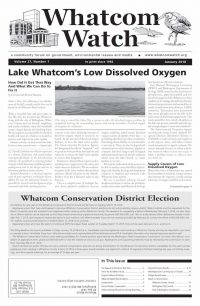by Robyn du Pré
Editor’s Note: Georgia-Pacific closed the chlorine plant in 1999. In 2001, it closed the chemical plant, and laid off 420 workers. In 2003/2004 there were cutbacks at the tissue mill; 44 workers were paid off. In 2004, the rest of the workers were laid off and GP placed the 137 acres on the market for $135 million and began negotiations with the Port of Bellingham. The Port Commission at the 1/18/2005 meeting, vote #17, approved the acquisition of the Bellingham Bay properties. The port accepted the property in exchange for an agreement to perform environmental remediation on the property.
In November 1997, the Clinton Administration signed into rule a new package of water and air standards for the nation’s pulp mills. The Environmental Protection Agency first proposed this “Cluster Rule” in December 1993 to regulate air and water discharges, especially dioxin, from pulp and paper mills.
The new rule applies to most mills in the country, including the Georgia Pacific plant in downtown Bellingham. While the rule is over 1,200 pages long, with many sub-sections and technical sections, the gist of it boils down to bleaching technology. Most mills in the U.S. use either elemental chlorine or chlorine dioxide to de-lignify and bleach pulp. Chlorine and chlorinated chemicals are of concern because their use can result in the production of dioxins and their close cousins the furans, a highly toxic family of cancer-causing chemicals that settle in fish and, in turn, in humans who eat the fish caught near pulp mills. Airborne dioxin is carried by the wind to settle on food crops and grazing lands. In addition to being a carcinogen, dioxin has been linked to neurological problems as well as problems of immunity, reproduction and development.
The new rule requires most mills to transition away from elemental chlorine and adopt chlorine dioxide bleaching processes, instead. All affected mills will be required to have their new bleaching technologies on-line within three years. This move will markedly reduce dioxin and furan production by pulp and paper mills. Many environmental and indigenous rights groups, however, feel that the Environmental Protection Agency did not go far enough. The use of chlorine dioxide in bleaching results in the lower levels of dioxins, but some dioxins are still produced. Many environmental groups promote the “totally chlorine-free” option already adopted by many European mills.
What does the Cluster Rule mean to our community? Georgia Pacific will have to change their bleaching process away from the use of elemental chlorine. This will result in a reduction, if not elimination, of dioxins being released into our environment. It will also result in a reduction of other hazardous air pollutants resulting from the bleaching process, such as chloroform.
But what about the chlorine plant? GP currently produces approximately 219 tons of chlorine per day at its downtown facility. They use about twenty percent of that chlorine in the mill’s pulping and bleaching processes. The remaining eighty percent is shipped out by rail for use by other mills and other users, such as municipal water treatment facilities.
This rule does not apply to the production of chlorine per se, but only its use in the pulp and paper process. So, GP will not have a use for the chlorine produced at its downtown chlorine production facility in its own processes and will lose much of its outside market for its chlorine, as well. We believe that once GP has transitioned to chlorine dioxide bleaching, it will be very difficult for the corporation to justify the continued manufacture of a chemical as hazardous as chlorine at this antiquated facility in the heart of our downtown.
RE Sources is currently working to encourage GP to close the chlorine plant. We have had a number of encouraging discussions with local plant officials. It seems that the corporation, head-quartered in Atlanta, will be making decisions about the chlorine plant within the next year or two. RE Sources will be working with local plant managers and corporate officials in Atlanta to encourage the company to be a responsible corporate neighbor and close the chlorine plant. We want to encourage the corporation to announce this closure in 1998 and to work with the community to plan for clean-up and to minimize job loss. We do not want the workers to suffer a last minute lay-off. Rather, we want the corporation to work with the community to plan this closure in a responsible manner. If you’d like to get involved in our work, give us a call. RE Sources can be reached at 360-733-8307 or www.re-sources.org.
______________________________
Robyn duPré was a local environmental activist and executive director of Re Sources.




























